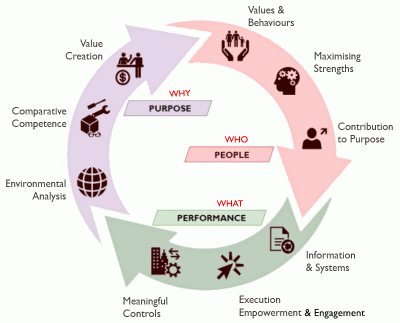It’s time to rethink management – not just for the current environment but for what lies ahead.
Many of the most valuable and successful organisations in the world today, did not exist a decade or two ago – evidence that a flexible, nimble and proactive approach is required.
Management must move beyond the traditional model of Strategy, Structure and Systems to a far more dynamic model of Purpose People and Performance.
The old Strategy framework is top-down, prescriptive and formulaic having evolved when corporations sought to minimise deviations, systemise people and processes to make them more manageable.
Unfortunately, this has made companies rigid and unable to respond to the fast-paced world of today.
An over-reliance on Systems has left employees increasingly disengaged and unable to identify or find meaning in the workplace. A Structure mindset that focuses on achieving financial and corporate targets at all costs has sidelined the importance of positive organisational culture and values – resulting in far too many scandals.
We need to explore a new way of managing organisations appropriate for the emerging economy, the greater needs of people without compromising ethics and morals.
9 Questions to ask of your organisation regularly
PURPOSE
1. Does the changing environment require us to revisit our fundamentals?
– Is our WHY still compelling? Is it still valid? Who is our customer? Who is our non-customer?
2. Has our comparative competence, expertise, core contribution changed?
– What are we better at than those around us? Are we doing what we are good at?
3. How do we create value? What gap do we fill? What problem do we solve? What pain do we take away? What gain do we provide?
– What does the customer value? Are there things we should stop doing? Start doing? Do less of? Do more of?
PEOPLE
4. Are our behaviours aligned to our values?
– Who’s not on the boat? If we started from scratch today who would we not have on the team? Why are they still on the team?
5. Are our people playing to their strengths?
– Are we providing the appropriate support structures for their weaknesses? Do we have people in the right seats on the bus?
6. Contribution to purpose?
– Do our people know the role they play in our success? Are they engaged in the organisation? Are we satisfying their needs: reward, recognition, voice, choice, learning & legacy?
PERFORMANCE
7. Does everyone have the information and systems do their job?
– Do they understand what success looks like if they do their job well?
8. Are the people and teams empowered to do their job?
– Do they have the necessary resources?
9. Do we have the right indicators and controls in place?
– How do we measure success? Qualitative & Quantitative? What time frames? At what cost?
1. PICK A FIGHT – PURPOSE
Every human being is unique with distinctive strengths (and weaknesses), has something important to contribute, and has a special purpose that needs to be pursued.2. FIGHT THE GOOD FIGHT – PEOPLE
Everything we do must be premised on the “Pursuit of Goodness” – considering not just “why who and what” but “HOW”. People and their behaviours are critical to this.3. FIGHT HARD – PERFORMANCE
Results require disciplined effort – a cost, a price to be paid, upfront, and at least proportionate to the desired outcome.
Purpose
Identifying the organisation’s purpose. Reason for being. Why we exist. What purpose do we serve?
• Environmental Analysis
• Comparative Competence
• Creating Value
People
Who do we want here? How do we maximise strengths? How do they meaningfully contribute to the organisation’s purpose?
• Culture & Values
• Maximising Strengths
• Contribution to Purpose & Performance – Scoresheet
Performance
How do we measure success? What time frames? At what cost? How do we execute our objectives? Qualitative & Quantitative?
• Appropriate Information
• Execution Empowerment
• Meaningful Controls – Scoreboard





